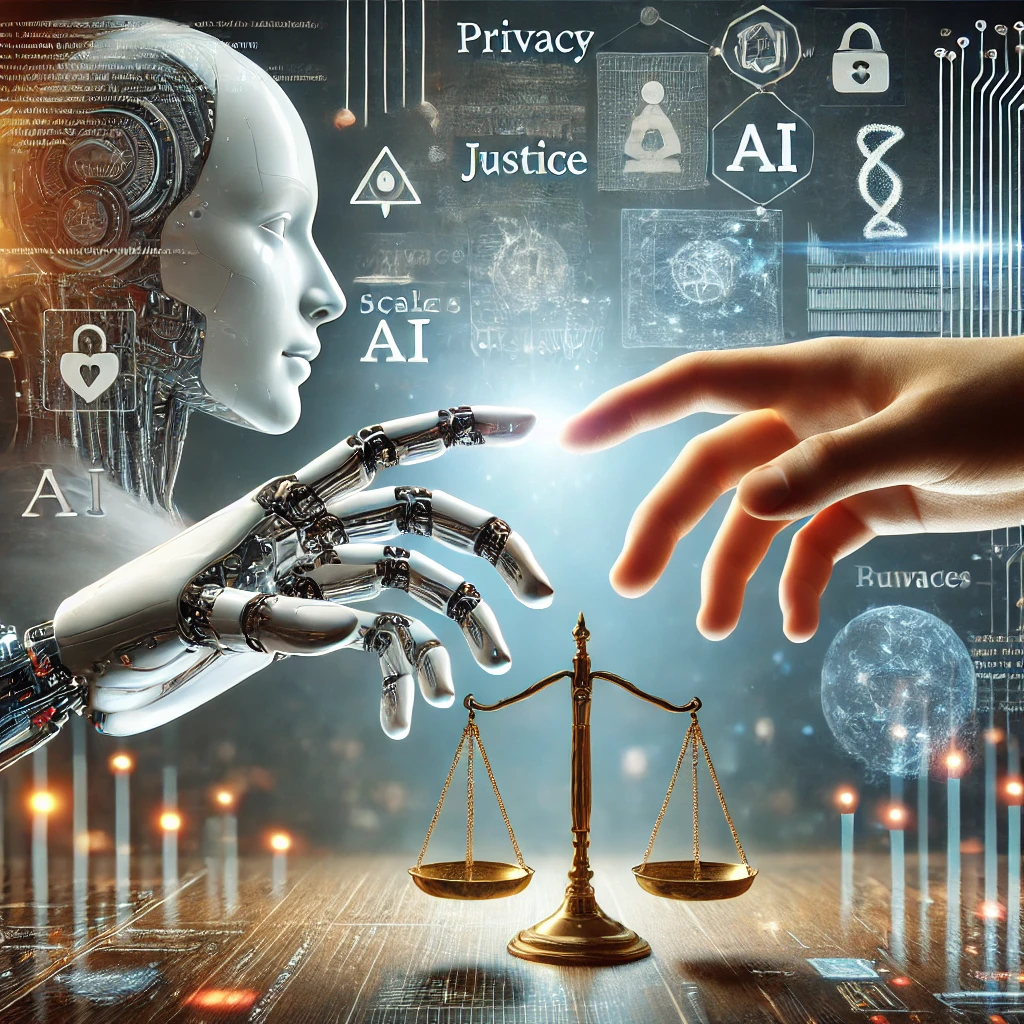
Artificial Intelligence (AI) is rapidly transforming various industries, from healthcare and finance to transportation and entertainment. While AI offers tremendous potential to improve efficiency, solve complex problems, and enhance quality of life, it also raises significant ethical concerns. The growing influence of AI on society presents challenges related to bias, privacy, accountability, and the displacement of jobs, among others.
In this article, we will explore the ethical implications of AI, the potential risks it poses, and how society can navigate these challenges to ensure responsible and equitable AI development.
1. The Promise and Perils of AI
AI holds great promise in addressing some of the world’s most pressing problems. From improving medical diagnoses and treatment through AI-driven systems to optimizing supply chains and logistics, AI can revolutionize industries and streamline human activity. However, with this potential comes the risk of unintended consequences.
One of the primary concerns is that as AI systems become more integrated into society, their decision-making processes may lead to outcomes that are not always fair or just. Since AI learns from data, it can inherit biases present in the data, resulting in discrimination or exclusion of certain groups. Additionally, the automation of jobs may lead to social and economic disruptions, disproportionately affecting workers in lower-income roles.
2. Bias and Fairness in AI
AI systems rely on vast datasets to train algorithms that perform tasks like facial recognition, language processing, and decision-making. However, the data used can often reflect societal biases. For example, facial recognition systems have been found to exhibit higher error rates when identifying people of color or women compared to white men, due to biased training datasets. Similarly, AI-driven hiring algorithms may inadvertently favor certain demographics over others if the data fed into these systems is not representative or inclusive.
This issue raises questions about fairness and equity. As AI systems become more prevalent in critical areas like healthcare, criminal justice, and education, biased algorithms can reinforce existing inequalities, perpetuating injustice. Ensuring that AI systems are developed with fairness in mind, through diverse datasets and careful monitoring, is crucial to preventing harm and discrimination.
3. Privacy Concerns
Another ethical challenge posed by AI is the erosion of privacy. AI technologies often rely on massive amounts of data to function effectively. This includes personal information such as medical records, social media activity, purchasing habits, and location data. The use of AI in surveillance, for example, has sparked debates about the right to privacy, as governments and corporations collect and analyze data on individuals without their explicit consent.
Facial recognition technology, used in public spaces and even online, further complicates the issue. While it can be valuable for security purposes, it can also be misused to track individuals without their knowledge. This constant monitoring raises concerns about the potential for an AI-powered surveillance state, where people’s movements and actions are tracked and recorded, leading to a loss of personal autonomy.
The ethical question here revolves around how much data should be collected, who has access to it, and how it is being used. Striking a balance between innovation and the protection of individual privacy is essential to maintaining trust in AI technologies.
4. Accountability and Transparency
One of the major concerns with AI is the lack of accountability. As AI systems become more complex, it becomes difficult to understand how certain decisions are made. This phenomenon, known as the “black box” problem, occurs when AI algorithms generate outputs without offering a clear explanation of the decision-making process.
This lack of transparency is especially problematic when AI systems are used in critical domains like law enforcement or healthcare. For instance, if an AI system denies a loan application or makes a misdiagnosis, it can be challenging to identify who or what is responsible for the error—the developers, the company using the system, or the algorithm itself.
Establishing clear guidelines for accountability is essential. Developers and companies need to ensure that their AI systems are interpretable and explainable, allowing humans to understand how decisions are made and to challenge unfair or incorrect outcomes.
5. Impact on Employment and the Economy
The rise of AI has sparked significant concern about the future of work. AI technologies, particularly automation, have the potential to displace millions of jobs, especially in industries like manufacturing, retail, and transportation. While AI can enhance productivity and efficiency, its impact on the workforce could lead to widespread unemployment and exacerbate social inequality.
At the same time, AI creates new job opportunities in fields such as AI development, data science, and ethical AI oversight. The challenge is ensuring that workers have the skills necessary to transition into these new roles. Reskilling and upskilling programs will be vital in preparing the workforce for the AI-driven economy. Policymakers must consider the implications of AI on labor markets and develop strategies to ensure that economic growth driven by AI benefits all segments of society.
6. Autonomous Weapons and AI in Warfare
The use of AI in warfare introduces significant ethical dilemmas. Autonomous weapons systems, also known as “killer robots,” have the capability to select and engage targets without human intervention. This raises questions about the morality of allowing machines to make life-and-death decisions, potentially leading to unintended casualties or violations of international humanitarian law.
AI in warfare also has the potential to escalate conflicts and make them more difficult to control. The absence of human judgment in critical situations could increase the risk of errors or misunderstandings. Ensuring that AI is used responsibly in military contexts is essential to preventing human rights violations and maintaining global peace.
7. Ethical AI Development and Regulation
To address the ethical implications of AI, it is crucial for governments, corporations, and academia to work together on establishing ethical guidelines for AI development and use. Several initiatives, such as the European Union’s guidelines for trustworthy AI and the IEEE’s Ethically Aligned Design framework, aim to create standards that prioritize human rights, fairness, and accountability in AI systems.
These guidelines emphasize principles such as transparency, privacy, security, and inclusivity. Additionally, they call for human oversight in AI decision-making processes to ensure that AI systems remain aligned with ethical values.
However, regulation alone is not enough. AI developers and companies must also take proactive steps to ensure that their systems are designed with ethics in mind from the outset. This includes conducting thorough impact assessments, ensuring diverse and representative data, and creating robust mechanisms for redress in case of harm.
AI presents both incredible opportunities and profound ethical challenges. Its ability to revolutionize industries and improve quality of life must be balanced with responsible development and careful consideration of its societal impacts. Issues of bias, privacy, accountability, job displacement, and the use of AI in warfare are all critical concerns that need to be addressed through collaboration between governments, industries, and civil society.
As AI continues to advance, it is essential that ethical considerations remain at the forefront of development to ensure that AI serves humanity’s best interests, fostering a future where technology is used to promote fairness, equality, and well-being for all.

